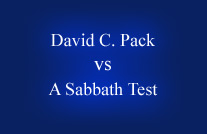

Argument XXI
Hiding Behind the Feast


In this particular installment of his defense of dining out on the Sabbath, Dave Pack invokes God's command regarding the Feast of Tabernacles. He actually presents two arguments in support of his claim. First, he contends that if God's people are responsible for the labor of those who serve them at a restaurant on the Sabbath then they would also have to be responsible for the Sabbath labor of hotel staff during the Feast of Tabernacles.
The second argument claims that because God's people were permitted to convert their assets to cash when traveling to the pilgrimage feasts, they must have been able to spend that money on holy time. In the interest of clarity, we will address these arguments separately, beginning with the first. Here is how Mr. Pack expresses it followed by our response.
David C. Pack:
“But let’s go further. Suppose one goes to the Feast of Tabernacles intending not to “sin” by eating out on the Sabbath. According to this standard, he would be sinning by renting a hotel room during that time. Even if he requested that his room not be cleaned on the Sabbath, he still benefits from what the hotel has to offer—water and electricity, security, heating, air conditioning, use of elevator, use of phone and daily updating of charges. These are all paid for, and require a support staff to do them.”
Our Response:
Dave Pack is not the only one to employ this stream of logic. One of the more prominent COG groups advanced his argument this way.
There are other areas that would be affected if one takes the position that eating in a restaurant on the Sabbath is a violation of the Sabbath. For example, when one goes to the Feast of Tabernacles, would we expect him to check out of his hotel room on Friday evening and not return until Saturday evening in order to keep from violating the Sabbath? By staying in a hotel on the Sabbath you are being served and you are being charged for that service. An entire staff of people is on duty 24 hours a day to serve your needs.
Here, both Dave Pack and others hide behind God's command to keep the Feast of Tabernacles in order to justify a practice that goes totally contrary to God's Sabbath law. Remember, although God does command His people to keep the feast, he also specifically prohibited them from acquiring and preparing their food on the weekly Sabbath (Ex. 16). Additionally, He prohibited them from purchasing any goods and services on holy time (Neh. 10:31).
Despite this fact, Dave Pack is convinced that going to a restaurant on the Sabbath or a holy day is the moral equivalent of staying in a hotel during the FOT. He then reasons that if God's people may do one, they may also do the other. But is this really true? Although Dave Pack makes no distinction between these two behaviors, it is clear that God does. For starters He permits one and forbids the other.
When making his assertion about hotel personnel, Mr. Pack omits an important point. Although a staff is there, God's people do not have to pro-actively solicit their service on the Sabbath any more than they have to pro-actively solicit the services of golf course personnel on the Sabbath. The fact that they are there to serve you is irrelevant.
However, when it comes to dining out on holy time, that is exactly what Dave Pack MUST do. He MUST pro-actively seek out unbelievers for the express purpose of Sabbath labor. He must do this because without that labor he can't do what he desires.
Something for Mr. Pack to Think About
The Sabbath is sacred. As such, it is to be treated with great deference and respect. It is not a time that should be spent engaging in the normal activities of the week. It is a time to come out of the world, not go back into it. The reason God's people should not dine out on the Sabbath is the same reason they should not check in or out of their festival housing on a Sabbath. The appropriate time for arriving at and departing from the FOT is prior to its start (a Sabbath) and after its conclusion (another Sabbath). Sadly, just as so many of God's people take a more casual approach when it comes to dining out on holy time, many of them also take a more casual approach to honoring this special festival.
Now for Mr. Pack's second point.
David C. Pack continued:
The Pilgrimage Sabbath
"Now notice God’s instructions concerning the Feast of Tabernacles, which includes annual and weekly Sabbaths:
And you shall eat before the Lord your God, in the place which He shall choose to place His name there, the tithe of your corn, of your wine, and of your oil, and the firstlings of your herds and of your flocks; that you may learn to fear the Lord your God always. And if the way be too long for you, so that you are not able to carry it; or if the place be too far from you, which the Lord your God shall choose to set His name there, when the Lord your God has blessed you: Then shall you turn it into money, and bind up the money in your hand, and shall go unto the place which the Lord your God shall choose” (Deut 14:23-25).
Food for the Sabbaths and annual Holy Days could not always be prepared on the day of preparation. Often, on long journeys, their food supplies were, of necessity, converted into money, which was spent upon arriving at the festival.
Verse 26 shows that finding pleasure, within reason, at God’s Feast is actually commanded! “And you shall bestow that money for whatsoever your soul lusts after [desires], for oxen, or for sheep, or for wine, or for strong drink, or for whatsoever your soul desires: and you shall eat there before the Lord your God, and you shall rejoice, you, and your household…”
Our Response:
At the risk of sounding redundant, it is important to remember that Mr. Pack's purpose in this essay is to prove that God's people may solicit the labor of unbelievers on holy time. In this particular phase of his argument he wants his reader to believe that because God's people had money for the feast, they must have spent it on the Sabbath or holy day. This is not a "Biblical fact." It is an unbiblical fiction. Here is what the scriptures actually say about Mr. Pack's claim. It is very telling to be sure.
Nehemiah 10:31
"And if the people of the land bring ware or any victuals on the Sabbath day to sell, that we would not buy it of them on the Sabbath, or on the holy day:"
Contrary to what Dave Pack argues, God's people NEVER purchased their Sabbath meals on holy time. It just didn't happen. Furthermore they NEVER prepared their Sabbath meals on the seventh day either. Both the scriptures and history bear this out (see: Millennial Sacrifices).
It is true that God's people often converted their assets to money when traveling to His annual festivals. However, it is totally false to suggest that they spent their money on the Sabbath or the holy day. It just WAS NOT DONE. Upon their arrival God's people would purchase provisions for the feast. Jesus' disciples even thought that is what Judas Iscariot was going to do when he left to betray the Messiah (Jn. 13:27-29). They obviously drew this conclusion based on experience. In other words, it was their practice. Furthermore, virtually all scholars acknowledge that ALL COMMERCE STOPPED and the Sabbath!
While Dave Pack fights to find a way to mitigate God's Sabbath law, the truth contained in scripture only reinforces it. God's word is clear. His people are NEVER to pro-actively seek out others to labor for them on the Sabbath or the holy day.
